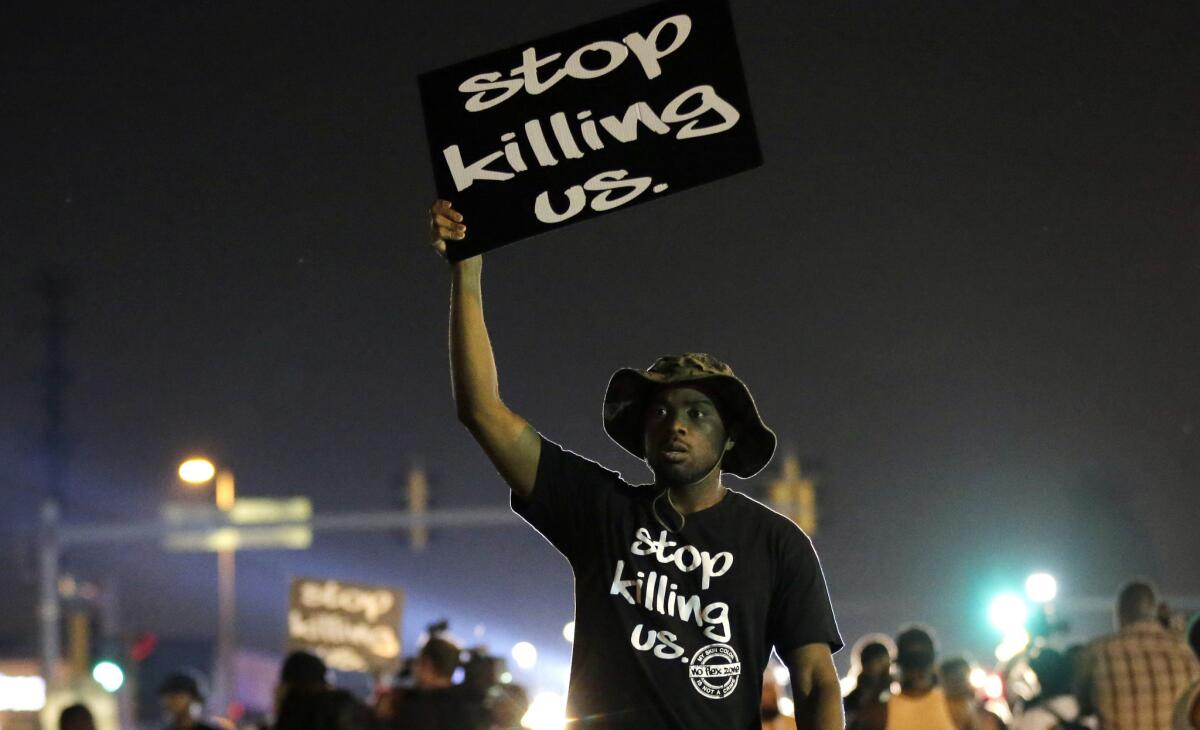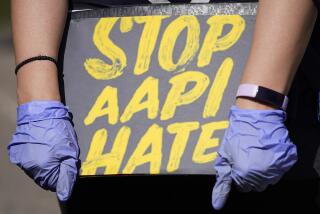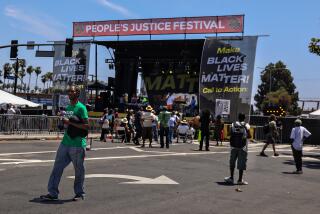After a year of high-profile killings by police, Americans’ views on race have shifted

A year after protesters walked the streets of Ferguson, Mo., American attitudes about race have undergone a significant shift, new polls are finding.
After a year of high-profile police shootings of black Americans, many captured on video, racial attitudes among Americans — particularly whites — have undergone a significant shift.
A majority of whites now say the country needs to do more to make equal rights a reality, and a significantly larger number of white Americans say that blacks are treated less fairly than others by law enforcement officials, according to several newly released polls.
The share of Americans who say that racism is a “big problem” in the U.S. has grown significantly as well.
Asked whether the country “needs to continue making changes to give blacks equal rights with whites” or whether it already has “made the changes needed,” Americans just short of 2 to 1 say more change is needed, according to a survey by the nonpartisan Pew Research Center.
A majority of whites, 53%, agree that more change is needed, according to the Pew survey and a separate poll by the Washington Post and ABC News, which asked the same question.
The polls, released Wednesday, come as the country approaches the Aug. 9 anniversary of the death of Michael Brown, the unarmed black 18-year-old whose shooting by a white officer in Ferguson, Mo., focused new attention on police use of force against minorities.
The shifts are significant. For the last several years, polls had shown that fewer than 4 in 10 whites said the country needed more change to achieve equality. Instead, a majority of whites consistently said the country already had “made the changes needed.”
Some of the activists involved in protests in the last year over the deaths of unarmed blacks at the hands of police took the shift in public opinion as at least a partial vindication.
“Man, that’s good, that’s huge,” said Tony Rice, a prominent Ferguson activist.
Rice, who has spent considerable time over the last year on a campaign to persuade white and black voters to recall Ferguson’s mayor, said white residents have often told him that the news during the last 12 months has caused them to rethink racial issues.
“They said, ‘We had no idea what you guys were being treated like,’” he said. “My thing was, ‘Hey, we tried to tell you, you just didn’t listen,’” Rice said. “Now they’re starting to listen”
DeRay Mckesson, a prominent activist in the Black Lives Matter movement, called the shift in attitudes “an acknowledgment of the impact of racism” that black Americans have long experienced. That’s a testament to the effect the protests in Ferguson and elsewhere have had, he said.
But a change in attitude is only partial progress, he said. “It will be important that knowledge translates into action, that people use their privilege to dismantle racist structures and systems,” he said.
Whether Americans’ shift in attitude will lead to support for specific policy changes remains an important unknown, said Carroll Doherty, the director of political research at Pew.
“Race appears to be more front and center than it has for a while,” Doherty said. But “it’s one thing to say more needs to be done about racial equality in general terms” and another to support specific policies, he said.
Even among African Americans, the already large number who say the country needs to make more changes has grown in the last year, the polls found, reaching 86% in the Pew survey. Latinos also say by large margins that more changes are needed.
Among whites, a big part of the shift in attitudes has come from Republicans.
The GOP remains more conservative on racial issues than Democrats or Americans who do not identify with either party. A majority of Republicans, for example, say the country already has made the necessary changes to achieve equality.
But among Republicans, the share who say the country needs to change further has grown 15 percentage points over the last year, Pew found.
By contrast with the partisan splits on racial issues, the numbers, surprisingly, don’t vary much between older and younger Americans.
Another measure — the share of Americans who say that racism in the U.S. is a “big problem” — has also shown a significant increase. Today, half of the country says racism is a “big problem,” Pew found, up from one-third five years ago and one-quarter at the time Barack Obama was inaugurated as the nation’s first black president.
Among whites, just over 4 in 10 now see racism as a big problem, up from 1 in 4 when the question was last asked, in 2010. A majority of blacks, 73%, and Latinos, 58%, call racism a big problem.
On that question too, a large share of the change has come from those who identify as Republican. The share in the GOP who say racism is a big problem has grown to 41%, up from just 17% in 2010.
Among Democrats, just under two-thirds see racism as a big problem, a proportion that has grown somewhat since 2010.
The percentage of Americans who described racism as a big problem fell from the mid-1990s, reaching a low point around the time of Obama’s election, which many Americans, including many blacks, took as an indicator that the country had finally turned a page on its long history of racial discrimination.
Now, however, the Pew poll, as well as a recent New York Times/CBS News survey, shows a sharp turnaround in attitudes.
The share of white Americans who say that blacks have an “equal chance” of “getting ahead in today’s society,” for example, has dropped by 10 percentage points since last year and now stands at 51%, the New York Times/CBS survey found.
Polls can’t explain why attitudes have shifted, but some analysts say social media have had a major effect.
Social media have taken conversations that in the past would have taken place in “private spaces” and made them visible to a wider community, said Meredith Clark, an assistant professor at the Mayborn School of Journalism at the University of North Texas who is conducting a research project on the Black Lives Matter movement.
That has made it possible for people to encounter views they might have been too uncomfortable to ask directly about, she said.
“It would be awkward if your co-worker came in and asked how you felt about seeing Mike Brown’s body on the ground in Ferguson last year,” Clark said. With social media, “you can just survey the information.”
That sort of change may have made white Americans more aware of the discrimination that nonwhites experience.
A fourth poll, by Gallup, released this week, asked Americans whether they believe blacks are treated less fairly than others in a variety of situations. The poll found notable increases in the share of people who think blacks are discriminated against.
Just over 4 in 10 people say blacks are treated less fairly in dealing with the police, the poll found, up 6 percentage points from 2007. About 1 in 4 Americans say blacks are treated unfairly at stores and shopping malls. The share saying that has grown by 10 percentage points, Gallup found.
The Pew poll was conducted July 14 to 20 among 2,002 American adults and has a margin of error of plus or minus 2.5 percentage points. The Washington Post/ABC poll was conducted July 29 to Aug. 2 among 1,010 adults and has a margin of error of plus or minus 3.5 points. The Gallup poll was conducted June 15 to July 10 among 2,296 adults and has a margin of error of plus or minus 4 points.
david.lauter@latimes.com
Twitter: @DavidLauter
matt.pearce@latimes.com
Twitter: @MattDPearce
ALSO:
Latinos’ rising fortunes are epitomized in Downey
Body camera video undercuts police account of skid row shooting, suit says
Detectives search for mother of newborn abandoned in stroller
More to Read
Start your day right
Sign up for Essential California for news, features and recommendations from the L.A. Times and beyond in your inbox six days a week.
You may occasionally receive promotional content from the Los Angeles Times.








